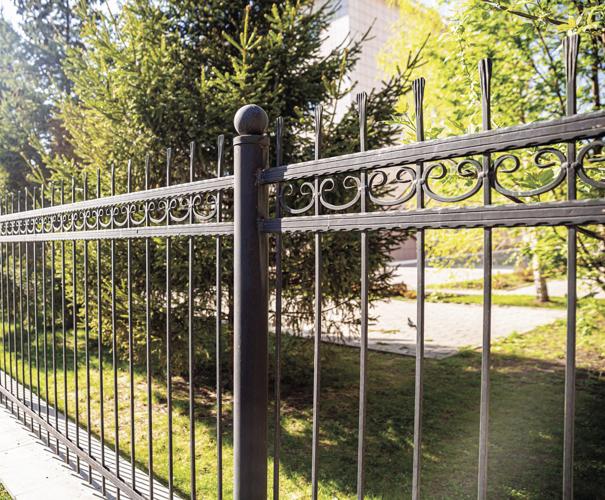Featured

Amongst the most prominent alternatives, timber, vinyl, and light weight aluminum each offer special advantages and disadvantages. Below's a breakdown of the pros and cons of these 3 common fencing materials.
Wood Secure Fencing. Wood fence has actually been an ageless option for house owners as a result of its natural elegance and flexibility.
Pros:. Aesthetic Charm: Wood provides a timeless and cozy look that complements a selection of building designs. Customizable: It can be painted, stained, or cut right into special designs to suit individual choices. Economical: At first, wood fence can be an inexpensive alternative contrasted to other materials. Eco-Friendly: Timber is a renewable energy and can be sustainably sourced. Cons:. High Upkeep: Wood needs routine securing, discoloration, or paint to prevent rot, insect damage, and weathering. Toughness Concerns: Without proper care, timber can warp, crack, or decay with time, particularly in locations with high humidity. Much shorter Life-span: A wood fencing usually lasts 10-20 years, depending upon the kind of timber and degree of upkeep. Wood is perfect for those who value a typical look and agree to commit to its upkeep.
Vinyl Fence. Plastic is a contemporary, low-maintenance fencing alternative that has expanded in appeal in recent times.

Pros:. Reduced Maintenance: Vinyl does not need paint, discoloration, or sealing and can be easily cleaned with soap and water. Weather Resistant: It stands up to severe climate condition without rotting, rusting, or bending. Lasting: Vinyl fences can last 20-30 years with marginal upkeep. Variety of Styles: Readily available in numerous colors, styles, and structures, some vinyl choices imitate the look of wood. Disadvantages:. Greater Upfront Price: Vinyl fence can be much more pricey at first compared to timber. Brittleness in Winter: In extreme cool, plastic might break or end up being brittle. Restricted Services: Specific panels can be challenging to replace, calling for cautious matching to the existing fencing. Vinyl is best matched for property owners looking for a long lasting, low-maintenance solution with contemporary visual appeals.
Light Weight Aluminum Fencing. Light weight aluminum fencing is a light-weight and durable option, usually selected for its modern look and versatility.
Pros:. Rust-Resistant: Aluminum does not rust, making it an exceptional selection for wet or moist environments. Low Maintenance: Requires minimal upkeep and is very easy to clean. Sturdy: While light-weight, light weight aluminum is solid enough to withstand numerous environmental conditions. Lengthy Life-span: Can last numerous years without substantial wear or deterioration. Range of Styles: Supplies a streamlined and sophisticated look, typically used for attractive or ornamental objectives. Disadvantages:. Higher Expense: The initial investment for light weight aluminum fence is higher than timber or vinyl. Much Less Privacy: Light weight aluminum fences are frequently created with open pickets, making them much less efficient for personal privacy. Prone to Damages: Although sturdy, aluminum can be nicked by strong effects. Aluminum is perfect for those looking for a trendy, durable alternative that requires marginal treatment.
Making the Right Selection. Each fence product-- vinyl, timber, and light weight aluminum-- supplies distinct benefits and disadvantages. Your choice must depend on your details concerns, such as budget plan, upkeep choices, climate, and aesthetic objectives:
If you love a standard look and don't mind routine upkeep,Choose timber. Opt for vinyl if you desire a low-maintenance, weather-resistant fencing with contemporary allure. Select light weight aluminum if you focus on toughness, rust resistance, and a sleek design. By evaluating these disadvantages and pros, you can choose a fencing product that improves your residential property while meeting your functional needs.
Latest Posts
The Ageless Charm of Montana Fencing's Wood Fencing
Published May 15, 25
1 min read
Discover Why Chicago Drivers Prefer Montclare Auto Repair for Dependable Service and Great Savings
Published May 15, 25
1 min read
Check Out the Greatest Auto Repair Deals in Montclare, Chicago
Published May 15, 25
1 min read
More
Latest Posts
The Ageless Charm of Montana Fencing's Wood Fencing
Published May 15, 25
1 min read
Discover Why Chicago Drivers Prefer Montclare Auto Repair for Dependable Service and Great Savings
Published May 15, 25
1 min read
Check Out the Greatest Auto Repair Deals in Montclare, Chicago
Published May 15, 25
1 min read